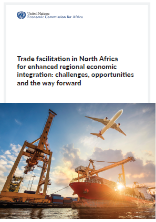Trade facilitation in North Africa for enhanced regional economic integration: challenges, opportunities and the way forward

Over recent years, the issue of trade facilitation has emerged as an important element of multilateral, regional, and bilateral trade debates. The growing importance of this issue has reflected the important structural changes in global production and trade over the last few decades. In particular, the expansion of global value chains as the key channel for organizing global production and trade over the last few decades entailed new requirements to facilitate the movement of parts and components and final goods across national borders (Memedovic and others, 2008; Saslavsky and Shepherd, 2012). With a number of multilateral, regional and bilateral trade agreements providing a higher degree of predictability relating to tariffs and non-tariff barriers, there has been growing recognition that custom procedures, delays and red tape pose significant barriers to the cross-border movement of products. Such barriers often lead to significant time delays and additional costs for firms by disrupting the operations of global value chains and affecting the ability of firms to participate in these increasingly time-sensitive chains. As lead firms in global value chains continued to adopt so-called “just-in-time” production and logistical models that focus on speed, agility, and lower inventory, the importance of predictable and speedy border crossings increased in global value chains.